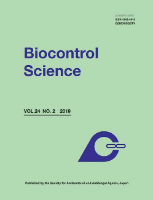
BIOCONTROL SCIENCE
metrics 2024
Pioneering solutions in biocontrol science and technology.
Introduction
BIOCONTROL SCIENCE, published by the SOC ANTIBACTERIAL & ANTIFUNGAL AGENTS in Japan, is an esteemed journal that focuses on the dynamic fields of Applied Microbiology and Biotechnology, as well as Public Health. With an ISSN of 1342-4815 and an E-ISSN of 1884-0205, this journal has been an important platform for disseminating research findings, contributing to its recognized Q3 quartile ranking in both fields as of 2023. Although the journal's H-index is yet to be established, its coverage from 1996 to 2022 showcases a solid foundation of scholarly works in biocontrol mechanisms, antifungal and antibacterial strategies, and their implications for health and the environment. Researchers and professionals will find valuable access options, further enhancing the journal's reach and impact within the scientific community. The journal serves as a critical resource, promoting knowledge sharing and innovation in tackling global health challenges, fostering interdisciplinary collaborations, and encouraging impactful research in biocontrol technologies.
Metrics 2024
 0.26
0.26 0.90
0.90 1.20
1.20 31
31Metrics History
Rank 2024
Scopus
IF (Web Of Science)
JCI (Web Of Science)
Quartile History
Similar Journals
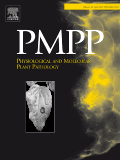
PHYSIOLOGICAL AND MOLECULAR PLANT PATHOLOGY
Bridging molecular insights with physiological understanding.Physiological and Molecular Plant Pathology is a leading journal published by Academic Press Ltd - Elsevier Science Ltd, dedicated to advancing our understanding of plant diseases through the synthesis of physiological and molecular perspectives. With an ISSN of 0885-5765, this esteemed journal has been a cornerstone in the field since its inception in 1986 and continues to publish critical research findings up to 2024. Notably, it holds a strong reputation in Plant Science, ranked Q2, and genetics, ranked Q3, reflecting its impactful contributions to these important areas of study. The journal is recognized within Scopus, achieving a ranking of 151 out of 516 in Plant Science, positioning it within the 70th percentile, making it a vital resource for researchers and students alike. While it is not an open-access journal, the insights provided in each issue are invaluable for those dedicated to understanding the complexities of plant pathology and enhancing agricultural resilience. Researchers, professionals, and students in the field are encouraged to explore and contribute to this pivotal journal, which plays a crucial role in driving innovation and discovery in plant health sciences.
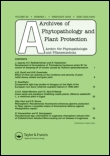
ARCHIVES OF PHYTOPATHOLOGY AND PLANT PROTECTION
Championing Research for Sustainable Agricultural PracticesArchives of Phytopathology and Plant Protection, published by Taylor & Francis Ltd, stands as a pivotal platform in the field of agronomy and crop science since its inception in 1974. With an ISSN of 0323-5408 and E-ISSN of 1477-2906, this journal is dedicated to publishing high-quality, peer-reviewed research that addresses contemporary challenges in plant pathology and protection. As a Q3 ranked journal in its category with Scopus Rank #210/406, it serves a vital role in disseminating practical solutions and innovative discoveries to enhance agricultural productivity and sustainability. The journal fosters a rich exchange of ideas among researchers, professionals, and students, empowering them to contribute to the advancement of the agronomy and biological sciences. Despite being traditionally subscription-based, the journal's commitment to comprehensive and rigorous research makes it an essential resource for anyone invested in the future of plant health and agricultural innovation.

Rhizosphere
Pioneering Insights into the Soil-Root InterfaceRhizosphere is a prestigious journal published by Elsevier that focuses on the integrative study of the soil-root interface and its immense implications in agronomy, crop science, and soil science. With an impressive track record since its inception in 2016, this journal stands out as a key resource in the field, achieving a Q1 ranking in three critical categories: Agronomy and Crop Science, Plant Science, and Soil Science as of 2023. The journal's impact is underscored by its ranks in Scopus, where it places within the top tiers of its fields—#72/406 in Agronomy and Crop Science, #92/516 in Plant Science, and #38/159 in Soil Science. Rigorous peer review and a commitment to open discourse make Rhizosphere an essential platform for researchers, professionals, and students who seek to advance their understanding of plant interactions with soil ecosystems. With accessible content options, the journal contributes significantly to advancing knowledge and innovation within the global scientific community.
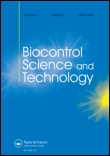
BIOCONTROL SCIENCE AND TECHNOLOGY
Pioneering Insights for Tomorrow’s Pest Management ChallengesBIOCONTROL SCIENCE AND TECHNOLOGY is a premier, peer-reviewed journal published by Taylor & Francis Ltd that specializes in the dynamic fields of Agronomy and Insect Science. Established in 1991, this journal has garnered a reputation for disseminating high-quality, impactful research with an impressive 2023 Scopus rank of 53 out of 181 in Insect Science and 153 out of 406 in Agronomy, placing it in the Q2 category for both fields. With its ISSN 0958-3157 and E-ISSN 1360-0478, the journal serves as a vital resource for researchers, professionals, and students dedicated to advancing understanding and innovation in pest management and biocontrol strategies. Although not an open-access journal, it offers comprehensive insights that are crucial for professionals aiming to tackle agricultural challenges and enhance food security. The journal’s continuous coverage from 1991 to 2024 ensures that it remains at the forefront of significant advancements in biocontrol, making it an essential read for anyone interested in sustainable agricultural practices and integrated pest management.

NEMATOLOGY
Advancing Knowledge in Nematological ResearchNematology is a prominent journal published by BRILL, focusing exclusively on the multifaceted realm of nematodes and their ecological, agricultural, and biological implications. With an ISSN of 1388-5545, this esteemed journal serves as a vital platform for researchers, professionals, and students dedicated to advancing knowledge in Agronomy and Crop Science and Ecology, Evolution, Behavior, and Systematics. Established in 1999 and continuing its mission until 2024, Nematology holds a Q2 ranking in Agronomy and Crop Science and a Q3 ranking in Ecology as of 2023, indicating its significant impact within these fields. Published in the Netherlands, this journal is accessible through various options, providing vital insights into nematological research and its applications. Researchers from around the globe are encouraged to explore, submit manuscripts, and contribute to the evolving discourse within this specialized yet pivotal area of study.

JOURNAL OF MICROBIOLOGY AND BIOTECHNOLOGY
Innovating Knowledge for a Sustainable FutureJOURNAL OF MICROBIOLOGY AND BIOTECHNOLOGY, published by the Korean Society for Microbiology and Biotechnology, is a premier academic journal based in South Korea that has been at the forefront of advancing knowledge in the fields of microbiology, biotechnology, and their applied sciences since its inception in 1991. This journal holds a commendable Q2 quartile ranking in key categories, including Applied Microbiology and Biotechnology, showcasing its significant impact within the academic community. With an emphasis on high-quality, peer-reviewed research, the journal aims to disseminate innovative findings that foster deeper understanding and advancements in microbial and biotechnological sciences. Researchers, professionals, and students utilize this journal to stay informed about contemporary developments and to inspire future investigations. Although it is not an open-access journal, its content is accessible through various academic libraries and databases, providing a vital resource for those engaged in cutting-edge research.
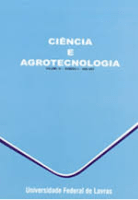
CIENCIA E AGROTECNOLOGIA
Cultivating Sustainable Solutions in AgritechCIENCIA E AGROTECNOLOGIA, published by UNIV FEDERAL LAVRAS-UFLA, is a vital open-access journal since 2005 that serves as an influential platform for disseminating research in the fields of Agronomy, Animal Science, Food Science, Soil Science, and Veterinary Science. With its ISSN 1413-7054 and E-ISSN 1981-1829, this journal is recognized for its contribution to science and technology advancements in agriculture, particularly in Brazil, fostering knowledge exchange among researchers, professionals, and students. Currently ranked in the Q2 quartile for Agronomy and Crop Science, Animal Science and Zoology, and in the Q3 quartile for Food Science and Soil Science, it demonstrates a solid international standing in the relevant Scopus indices. The journal's commitment to open access ensures that critical research findings are freely available, enabling a broader impact and encouraging collaborative advancements in agritech. As the journal looks towards its converged years from 2007 to 2024, it continues to uphold its objectives of promoting sustainable practices and innovation within the agricultural sciences.
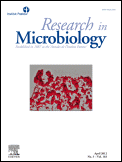
RESEARCH IN MICROBIOLOGY
Advancing the frontiers of microbiological research.Research in Microbiology, published by Elsevier, is a prominent academic journal devoted to advancing the field of microbiology, encompassing a diverse array of topics including immunology, molecular biology, and biochemistry. Established in 1987, the journal has expanded its focus over the years, with a commendable impact factor reflecting its relevance and influence in the scientific community. Although it does not currently offer open access options, Research in Microbiology remains a crucial resource for researchers and professionals seeking to stay abreast of the latest findings and methodologies. The journal holds a respectable Q2 ranking in Medicine (miscellaneous) and a Q3 ranking in both Microbiology and Molecular Biology for 2023, highlighting its position within the scholarly landscape. With its base in France and accessible to a global audience, Research in Microbiology continues to foster scholarly exchange, making it an essential platform for the dissemination of impactful microbiological research.
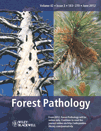
FOREST PATHOLOGY
Exploring the Dynamics of Forest HealthFOREST PATHOLOGY is a premier journal published by Wiley that focuses on the intricate relationships between trees, pathogens, and forest health. With an ISSN of 1437-4781 and an E-ISSN of 1439-0329, this British journal has garnered an impressive reputation in the fields of Ecology and Forestry, achieving a Q2 Quartile ranking in both categories as of 2023. The journal invites researchers and professionals to explore cutting-edge studies and case reports that delve into forest pathology, contributing to the understanding of disease dynamics and management in forest ecosystems. Currently indexed in Scopus, it ranks 61st out of 174 in the Forestry category and 214th out of 461 in Ecology, reflecting its impact and relevance in advancing the field. Access options are available to cater to a wide audience, emphasizing the journal's commitment to disseminating vital knowledge that enhances forest management practices and ecological resilience. FOREST PATHOLOGY stands as an essential resource for those dedicated to the health and sustainability of forest ecosystems.
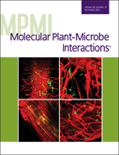
MOLECULAR PLANT-MICROBE INTERACTIONS
Fostering Innovations in Plant-Microbe ResearchMOLECULAR PLANT-MICROBE INTERACTIONS is a premier journal dedicated to the exploration of the complex interactions between plants and microbes, providing a vital platform for researchers in agronomy, crop science, and plant physiology. Published by the American Phytopathological Society, this journal has been serving the academic community since 1988 and continues to be at the forefront of advances in molecular biology and plant-microbe symbiosis, with a notable impact factor reflecting its esteemed position in the field. As a Q1 journal in both Agronomy and Crop Science and Medicine (miscellaneous), and holding a significant ranking in the Scopus categories, it is recognized for publishing high-quality, peer-reviewed research that is essential for understanding and improving agricultural practices. Although it is not an open-access journal, it provides critical insights that facilitate collaborative efforts among researchers, professionals, and students alike. The journal’s objectives focus on enhancing our understanding of plant health, disease resistance, and ecological sustainability, making it a crucial resource for anyone interested in the intricate research landscape of plant-microbe dynamics.